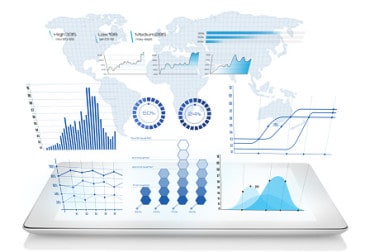
Quantum compute capacity is set to speed up our computing speeds by enormous factors. The impact of this on today’s data-driven enterprise will be huge.
Quantum computing is coming to a data center or cloud near you; it is poised to become part of the mainstream technology world, and its potential implications are staggering. For starters, it will be blazing fast, beyond anyone’s current experience with computers – making the real-time enterprise a reality.
IBM, for one, announced the commercial availability of quantum computing systems at the end of 2017, which included two significant quantum processor upgrades for its IBM Q early-access commercial systems. The vendor says it is focused on making available advanced, scalable universal quantum computing systems to clients to explore practical applications.
See also: IBM set to move quantum computing forward
The latest hardware advances are a result of three generations of development since IBM first launched a working quantum computer online for anyone to freely access in May 2016. Within 18 months, IBM has brought online a 5 and 16 qubit system for public access through the IBM Q experience and developed the world’s most advanced public quantum computing ecosystem.
Both Microsoft and Google are said to be ready to introduce quantum computing platforms as well, according to a report by Richard Waters of The Financial Times.
Quantum computing — which employs quantum mechanics to base routines on subatomic particles — has also captured the attention – and funds – of leading venture capital firms, according to an analysis by David Schatsky and Ramya Kunnath Puliyakodil, both with Deloitte. At the time this report was published last spring, venture capital investors had placed $147 million with quantum computing start-ups; governments globally have provided $2.2 billion in support to researchers. Quantum application areas being explored include computationally intensive problems in finance, risk management, cybersecurity, materials science, energy, and logistics, the Deloitte authors state.
How will quantum computing help today’s enterprises? “Quantum computers, by harnessing the bizarre properties of subatomic particles, will be able to perform certain kinds of calculations exponentially faster than the fastest computers currently known,” according to Schatsky and Puliyakodil. “Researchers say this power will enable quantum computers to break the encryption systems that currently keep online transactions safe around the world; discover optimal investment portfolios with greater precision and speed than the most sophisticated models in use today; and help design new materials and industrial processes by precisely predicting the behavior of molecules.”
Evan Kirstel sees potential applications in healthcare as well. “Quantum computers will permit the development of complex reenactments that will assist in finding cures for most non-curable illnesses, such as AIDS and cancer,” Kirstel states. “Quantum computers will enable us to model the thousands of proteins encoded in the human genome and begin to recreate their responses to different drugs or medications. This will pave the way to a radically new level of restorative innovative work and medical research.” There is potential in artificial intelligence and cybersecurity as well, Kirstel says.
The Deloitte report also sees a range of emerging applications across many different sectors. “Financial services firms are notably active,” the Deloitte authors note. “For instance, Barclays, Goldman Sachs, and other financial institutions are investigating the potential use of quantum computing in areas such as portfolio optimization, asset pricing, capital project budgeting, and data security. In aerospace, Airbus is exploring applications in communications and cryptography, while Lockheed Martin is investigating applications in verification and validation of complex systems and accelerating the development of machine-learning algorithms.”
As noted in the Financial Times article, there are still hurdles to overcome in making quantum computing available to the world, especially in terms of scaling the fundamental units — qubits – to enterprise workloads. “Apart from the difficulty of getting qubits to maintain their quantum states for more than a few microseconds, the problems include designing electronic controls that can operate at extremely low temperatures. ‘It’s going to be very hard to continue to scale,’” Mike Mayberry, head of Intel Labs, is quoted as saying, who also states that that practical applications are still about 10 years out.
The Coming Quantum Compute Era
While mainstream commercial quantum applications are still way off, the Deloitte report authors say enterprises should begin to prepare for the coming quantum era, which may arrive within the next decade.
Reimagine analytic workloads. “Many companies regularly run large-scale computations for risk management, forecasting, planning, and optimization. Quantum computing could do more than just accelerate these computations—it could enable organizations to rethink how they operate, and to tackle entirely new challenges. Executives should ask themselves, ‘What would happen if we could do these computations a million times faster?’ The answer could lead to new insights about operations and strategy.”
Update high-performance computing architectures. “Enterprises that have already invested in high-performance computing (HPC) should familiarize themselves with the impact that quantum computing may have on the architecture of HPC systems. Hybrid architectures that link conventional HPC systems with quantum computers may become common.”
Create a long-range post-quantum cybersecurity plan. With quantum computing power, passwords could be hacked within nanoseconds. “A US government-backed standards-setting body recently assessed the threat of quantum computers and advised organizations to develop ‘crypto agility’—that is, the ability to swiftly switch out algorithms for newer, more secure ones as they’re released.





























